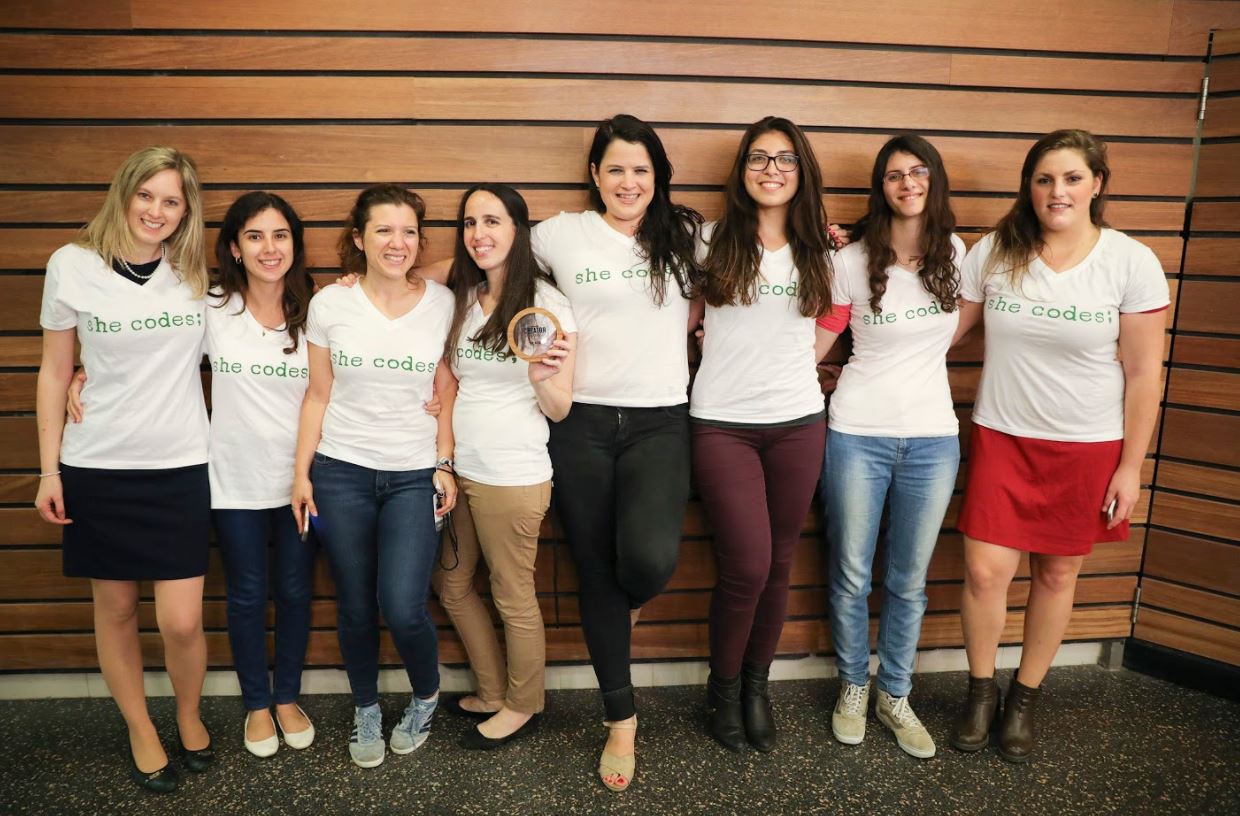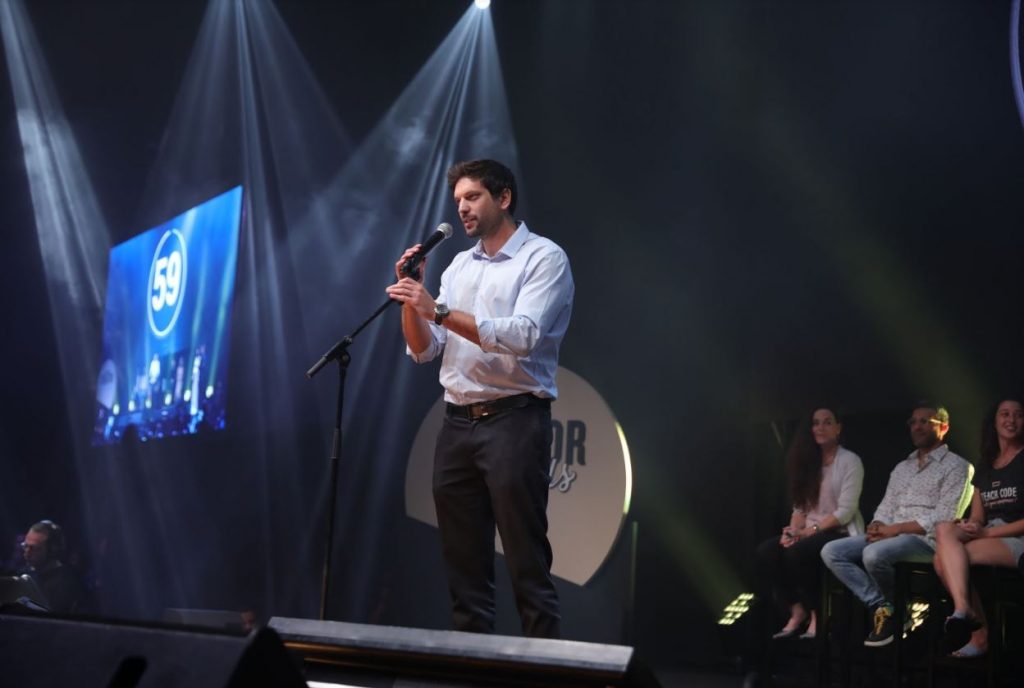Twenty Israeli startups and organizations were honored at an award ceremony in Tel Aviv on Thursday hosted and sponsored by Israeli-founded company WeWork, which in recent years has become a global giant in providing shared workspace communities, and services for entrepreneurs, freelancers, startups and small businesses across the world.
The Israeli startups, each in the process of taking their ideas to the next level, whether though funding or expansion, were recognized in three categories — Incubate, Launch, and Scale — at the WeWork Creator Awards, a global initiative to recognize Israeli innovation with a social cause launched in March 2017. It was set up to mark a major milestone, as the WeWork community reached 100,000 members.
By the end of the night Thursday, which also included a job fair, a pop-up market, master classes from Israeli entrepreneurs, food and drinks, and performances from groups like A-WA and Yemen Blues, WeWork gave away over $1.5 million to the finalists in each of the three categories. Some also earned a 1-year membership for WeWork office space and the opportunity to present their company at the WeWork global finals taking place in New York in January 2018, where they will compete against organizations from North America and Europe.
WeWork founder and CEO Adam Neumann took to the stage at the event at the Tel Aviv Convention Center to say that “Israel is special,” filled with “an energy” that has helped it earn the “Startup Nation” title.
“People here do things from the heart,” he said, waxing poetic about the sense of belonging he feels here every time he returns from his home in New York. “I always felt part of a community, and that community is called Israel. We are so lucky to have this.”
It is with this sense of community that Neumann founded WeWork in 2010. In the seven years since, WeWork has established locations in 23 US cities and 16 countries, most recently moving its New York headquarters into the former Lord & Taylor building on Manhattan’s Fifth Avenue. In July, the company announced a valuation of $20 billion after a $760 million Series G funding round.

The She codes team were recognized for their efforts in teaching women how to code, earning $180,000 from WeWork. Courtesy
SEE ALSO: Israel’s Office-Sharing Startups Are Changing The Way We Work Globally
Incubate, launch, and scale
While the nine finalists in the Incubate category received a free 1-year membership to an Israel-based WeWork coworking space of choice, certain finalists in the Launch and Scale categories were chosen to present a 1-minute pitch about their startup to the audience and a group of judges from places like Microsoft and Ernst & Young.
In the Launch category, renowned Danish architect Bjarke Ingels compared launching a product to designing a building and said the two are very similar because both are giving form to something, as well as identifying the changing world. Of the 13 participating startups recognized in the Launch category, seven were chosen to pitch to the judges why their company was doing just that, while also making an impact.
The startup, Handy Bag, presented by Yair Zur, is in the process of creating a bag with a cutting-edge design allowing easy access to personal belongings for wheelchair users. The QueenB startup, featuring a pitch by crowd favorite Yasmin Dunsky, teaches coding to young girls, with female computer science students acting as mentors. Judges chose companies QueenB, VoiceItt, ItWorks, and Resymmetry for a $72,000-prize and eye device maker Eyefree Assisting Communication for a $130,000-prize.
In the Scale category, companies like Code Monkey, Tovanot B’Hinuch, SheCodes and A.M.A.L. stood out for their initiatives in education, targeting both the student and the teacher in various areas like high-tech, the local and international school system, and language. SheCodes and Tovanot B’Hinuch both earned $180,0000 from WeWork.
But it was the commercial grasshopper farm Hargol FoodTech (formerly Steak TzarTzar, with “tzartzar” being the Hebrew word for grasshopper) that stole the show, as co-founder and CEO Dror Tamir tried to convince the audience that insect protein is the future. Based on his pitch (and all the brands that are currently interested in working with insect protein,) he may be right. According to Tamir, Doritos has already introduced a chip with insect protein and the Scandanavian warehouse chain Ikea is looking to use insect protein in its restaurants around the world. These companies as well as Coca-Cola and Guinness have expressed interest in Hargol FoodTech, Tamir indicated.
Sign up for our free weekly newsletter
Subscribe“Our vision is to feed the world with a healthier and more sustainable protein source from grasshoppers, as grasshoppers are nature’s most efficient protein source,” he told NoCamels.
Hargol FoodTech and Eyefree will be heading to New York to participate in the global finals in January. In the meantime, the eye device maker will use its winnings to further develop its market in order to put the device on the market sometime next year while the grasshopper farm will accelerate its production scale to meet the current demand it has from existing markets.

Hargol FoodTech received $360,000 from WeWork, thanks in part to Dror Tamir’s 1-minute pitch on the pros of insect protein. Courtesy
Giving back: Companies with a social responsibility
The Creator Awards event was more than just recognizing and rewarding the creators of the “Startup Nation.” It was also about collaborating with WeWork and promoting companies and organizations making the world a better place.
QueenB’s founder Yasmin Dunsky even put that in her pitch. “The Creator Awards prize will allow us to expand to other areas in Israel by opening activity centers in each of the four big universities,” she told the crowd.
“There was really a feeling in the atmosphere,” Or Retzkin of Eyefree told NoCamels. “The WeWork CEO [Adam Neumann] spoke about community. I think WeWork really puts community in its agenda.”

Eyefree Assisting Communications co-founder Or Retzkin pitches the advantages of his company’s eye control device in 60 seconds. Courtesy
Hargol’s Tamir said his company sees “great potential in collaborating with WeWork world-wide establishing grasshopper farms across the globe.”
“For us the win and recognition are important,” added Tamir. “After a very long period of over 3 years when no one believed in us and most considered us disgusting and strange, we are finally receiving the recognition of having the potential to change the lives of millions and billions around the world.”
SEE ALSO: Israeli Startup Breeds Protein-Rich Edible Insects to End World Hunger
QueenB co-founder Noga Mann told the official WeWork Creator website, “What I love about QueenB is that we don’t only teach girls how to code but also teach them how to take on challenges and face them, something that we believe will give them an advantage, no matter what they will do later in life.”
Further proof that WeWork promotes community and Israelis do things from the heart? The recognition of companies like Adopt-a-Safta, Assaf’s Luxembourg’s Startup Nation, and the Elevation Academy as part of the Community Giver award. Adopt-A-Safta, a non-profit initiative pairing young people with Holocaust survivors received $36,000, Assaf Luxembourg received $36,000, and the Elevation Academy received $18,000.
Images: Courtesy
Related posts

Editors’ & Readers’ Choice: 10 Favorite NoCamels Articles

Forward Facing: What Does The Future Hold For Israeli High-Tech?

Impact Innovation: Israeli Startups That Could Shape Our Future




Facebook comments